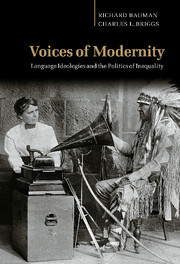Book contents
- Frontmatter
- Contents
- Preface
- 1 Introduction
- 2 Making language and making it safe for science and society: from Francis Bacon to John Locke
- 3 Creating modernity's others in seventeenth- and eighteenth-century England: antiquarian and philological inflections
- 4 The critical foundations of national epic and the rhetoric of authenticity: Hugh Blair and the Ossian controversy
- 5 Language, poetry, and Volk in eighteenth-century Germany: Johann Gottfried Herder's construction of tradition
- 6 Scientizing textual production in the service of the nation: the Brothers Grimm and Germanic philology
- 7 The making of an American textual tradition: Henry Rowe Schoolcraft's Indian researches
- 8 The foundation of all future researches: Franz Boas's cosmopolitan charter for anthropology
- 9 Conclusion
- References
- Index
1 - Introduction
Published online by Cambridge University Press: 22 September 2009
- Frontmatter
- Contents
- Preface
- 1 Introduction
- 2 Making language and making it safe for science and society: from Francis Bacon to John Locke
- 3 Creating modernity's others in seventeenth- and eighteenth-century England: antiquarian and philological inflections
- 4 The critical foundations of national epic and the rhetoric of authenticity: Hugh Blair and the Ossian controversy
- 5 Language, poetry, and Volk in eighteenth-century Germany: Johann Gottfried Herder's construction of tradition
- 6 Scientizing textual production in the service of the nation: the Brothers Grimm and Germanic philology
- 7 The making of an American textual tradition: Henry Rowe Schoolcraft's Indian researches
- 8 The foundation of all future researches: Franz Boas's cosmopolitan charter for anthropology
- 9 Conclusion
- References
- Index
Summary
One can see how a conception of the state–society relation, born within the parochial history of Western Europe but made universal by the global sway of capital, dogs the contemporary history of the world.
Chatterjee 1993: 238The project of provincializing “Europe” therefore cannot be a project of “cultural relativism.” It cannot originate from the stance that the reason/science/universals which help define Europe as the modern are simply “culture-specific” and therefore only belong to the European cultures. For the point is not that Enlightenment rationalism is always unreasonable in itself but rather a matter of documenting how – through what historical process – its “reason,” which was not always self-evident to everyone, has been made to look “obvious” far beyond the ground where it originated.
Chakrabarty 1992: 23In the summer of 1643, fearing for his son's safety in the face of the Civil War violence then swirling around Oxford, John Aubrey's father summoned him home from his beloved university to the family estate at Broadchalke, in the south of Wiltshire. Young John languished in rustic isolation for three long years; he describes his sojourn in the country as “a most sad life to me … not to have the benefitt of an ingeniose Conversation.” For Aubrey, whose company was widely valued in his later life for his skill and grace as a conversationalist, it was a special hardship to have “none but Servants and rustiques” – he terms the local inhabitants “Indigenae, or Aborigines” – with whom to converse (Aubrey 1847 [1969]: 11).
- Type
- Chapter
- Information
- Voices of ModernityLanguage Ideologies and the Politics of Inequality, pp. 1 - 18Publisher: Cambridge University PressPrint publication year: 2003

